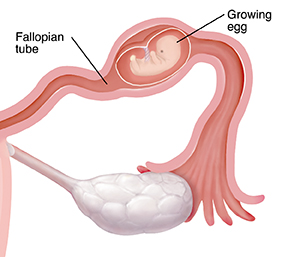Ectopic Pregnancy
When a person becomes pregnant, a fertilized egg (ovum) attaches to the inside of the uterus (womb) where it grows. But in some cases, the egg can attach outside the uterus. This most often happens in a fallopian tube. This is called an ectopic pregnancy. You might also hear this called a tubal pregnancy. But the egg can attach in other places, too. These areas may include the ovary, cervix, or belly (abdomen). An ectopic pregnancy in these places is rare.
The egg growing in the fallopian tube can cause the tube to burst (rupture). This can lead to severe bleeding. It needs to be found early and treated right away.

What causes ectopic pregnancy?
Most often, there is a problem with the fallopian tube. This problem stops the egg from moving through it and into the uterus. This could be due to injury to the tube. This may be from an infection or surgery. A person's risk for an ectopic pregnancy can increase if they have had:
-
An ectopic pregnancy in the past
-
Pelvic infections that keep coming back
-
Endometriosis
-
Problems getting pregnant (infertility)
-
Surgery on the tubes
-
A pregnancy while using certain birth control pills or an intrauterine device
A person may also be at higher risk if they:
-
Smoke
-
Are over age 35
-
Use douches often
What are the symptoms of ectopic pregnancy?
The symptoms most often occur in the first 12 weeks of pregnancy. This is the first trimester. A person may first have symptoms of early pregnancy, such as:
If the pregnancy is ectopic, symptoms may also include:
The pain may:
But in some cases, a person may have no symptoms.
As an ectopic pregnancy grows, symptoms may increase. If the tube bursts, the person may have:
If an ectopic pregnancy bursts, it can lead to severe internal bleeding that can threaten the pregnant person's life. Treatment is needed right away.
What is the treatment for ectopic pregnancy?
An ectopic pregnancy can be treated in several ways. Treatment may include:
-
Medicine. One or more doses of medicine may be injected. This is to stop the fertilized egg cells from growing. Then the body absorbs these cells. Hormone levels are tested at certain times. This testing is used to make sure that hormone levels have gone back to normal.
-
Surgery. Surgery is done to remove part or all of the tube where the ectopic pregnancy is found. If a person shows signs that the tube might burst or has burst, they need surgery right away.
-
Watchful waiting. This is only done with some people who are at a very low risk for rupture. It includes close checking of symptoms, hormone level testing, and ultrasound scans.